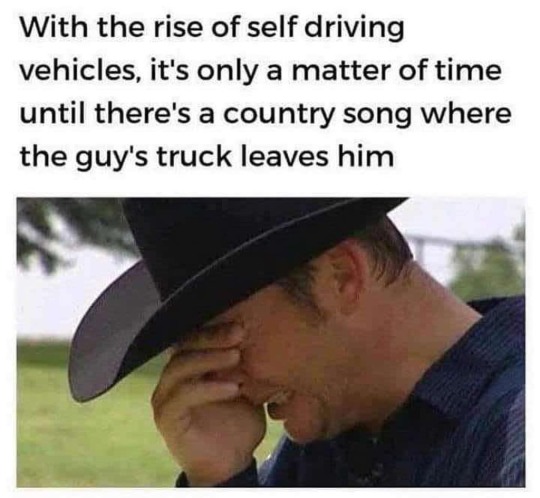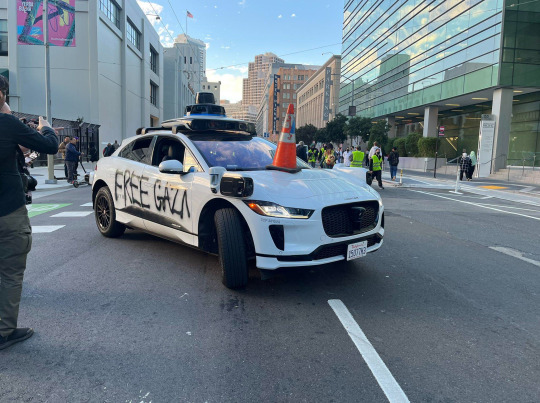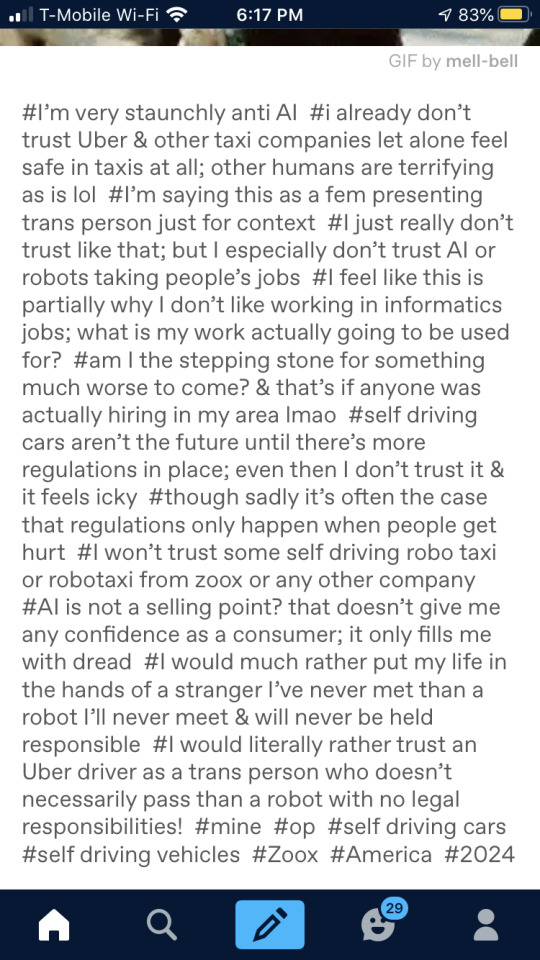#self driving vehicles
Text
We don’t yet know exactly why a group of people very publicly graffitied, smashed, and torched a Waymo car in San Francisco. But we know enough to understand that this is an explosive milestone in the growing, if scattershot, revolt against big tech.
We know that self-driving cars are wildly divisive, especially in cities where they’ve begun to share the streets with emergency responders, pedestrians and cyclists. Public confidence in the technology has actually been declining as they’ve rolled out, owing as much to general anxiety over driverless cars as to high-profile incidents like a GM Cruise robotaxi trapping, dragging, and critically injuring a pedestrian last fall. Just over a third of Americans say they’d ride in one.
We also know that the pyrotechnic demolition can be seen as the most dramatic act yet in a series of escalations — self-driving cars have been vocally opposed by officials, protested, “coned,” attacked, and, now, set ablaze in a carnivalesque display of defiance. The Waymo torching did not take place in a vacuum.
To that end, we know that trust in Silicon Valley in general is eroding, and anger towards the big tech companies — Waymo is owned by Alphabet, the parent company of Google — is percolating. Not just at self-driving cars, of course, but at generative AI companies that critics say hoover up copyrighted works to produce plagiarized output, at punishing, algorithmically mediated work regimes at the likes of Uber and Amazon, at the misinformation and toxic content pushed by Facebook and TikTok, and so on.
It’s all of a piece. All of the above contributes to the spreading sense that big tech has an inordinate amount of control over the ordinary person’s life — to decide, for example, whether or not robo-SUVs will roam the streets of their communities — and that the average person has little to no meaningful recourse.
519 notes
·
View notes
Text

#dank memes#funny post#meme#dank#funny#funny pics#silly#funny pictures#dankest memes#humor#self driving vehicles#country music
336 notes
·
View notes
Text
Self driving cars are an inevitability at this point.
Not just assisted, but full autonomous driving. And it is going to fundamentally change our relationship with cars and transportation in general.
People are going to stop buying cars. The whole sales pitch of everyone buying their own self driving car is ludicrous— it fundamentally misses the opportunity that self driving actually presents.
Owning a car sucks. Having constant immediate access to transportation is a form of autonomy.
Both those things can be true. A car has to be maintained, insured, parked, replaced, protected, fueled— this whole laundry lists of responsibilities to maintain access to self directed transportation.
What about all the perks of having a car, but none of the hassle? That’s what a self driving car offers. A car when you need it, where you need it, without having to worry about everything else that goes along with owning a car.
Because you won’t own the car.
How much time do you actually spend driving? How much time is your car just sitting there? Why worry about and pay for a car you’re not driving?
Your car is going to be a subscription service
Uber is already testing this basic model, but in a world of self driving cars it makes perfect sense. You don’t own a car. You have a Car Subscription, which means there is a car there to drive you when you need— scheduled in advance or on demand. You pay for different subscription levels (pay per mile, unlimited, luxury, etc)
A personalized public transportation
People will realize owning a car is actually a burden, and a fleet of self driving cars that take themselves for servicing and refueling is actually a world easier.
There are going to be two major downsides
First, you are going to be tracked. Not just where you’re going but what you’re listening to and riding with on the way there. Think about it— you will not be able to anonymously go anywhere
Owning a car will become suspicious— an expensive luxury that offers anonymity. It will be like having a pager in the 90s— associated with doctors and drug dealers. Bikes and motorcycles will thrive in the ‘socially acceptable non tracked transportation’
Second major issue will be ads
The double edge sword of a self driving car is that it frees you up to do other things.
You think you are going to get to sit and enjoy life uninterrupted by ads during your morning commute? Your Hulu and Netflix are already synced— you buckle your seatbelt and your episode picks up where you left off. Spotify is connected. Your use profile instantly tailors the ride to your tastes
Just watch a couple ads first
You can always pay extra to go ad free. You’re just sitting there anyways. Also means they can finally get rid of billboards (or at least move them to inside the car). Short on funds? Watch ads your whole ride for a discount.
Even shorter on funds? Well, we reached your destination, but the doors won’t unlock until you finish watching this two minute ad (and no closing your eyes)
51 notes
·
View notes
Text
Do you trust self driving cars? 🤔
#pay attention#educate yourself#educate yourselves#knowledge is power#reeducate yourself#reeducate yourselves#think for yourself#think for yourselves#think about it#do your homework#do some research#do your own research#do your research#self driving vehicles
128 notes
·
View notes
Text
Self-Driving Lies
I'm really mad at several college professors in the CS department at my undergrad who told us all "self driving cars are coming" and trusting them as authorities I quashed my many qualms and wasted a lot of time in otherwise important conversations about urban planning insisting that we account for the impact of this 'inevitable' variable.
"They will be safer than human drivers." tapped into my confirmation bias ... I hate drivers, after all. Of course every one could be bested by a machine.
I should have trusted what I'd learned from first-hand experience programming & writing programs that processed images & that made decisions.
I should have noticed the parallels to the 'work' (self-perpetuating failure cycle) of the RAND corporation & compstat.
I knew the problem of making a car drive was hard. Messy. But, I dismissed this knowledge from my experience because authoritative people said "the smart boys in the valley have this all worked out"
Never. Ever. Again.
Will I.
At least the only harm I have done by being duped has been limited to wasting time thinking about things that just won't happen.
But I suspect that isn't the case for everyone who was taken in.
#self driving cars#self driving vehicles#urban planning#public transportation#technology#duped#times I was fooled#lessons learned#life lessons
46 notes
·
View notes
Text

I love San Francisco. So many things converging in one shot.
#San Francisco#free Gaza#Palestine#protest#waymo#APEC#unicorn#self driving vehicles#autonomous vehicles#cruise#civil disobedience#California#doom loop#street art
20 notes
·
View notes
Text
I refuse to hop in a Zoox car in my entire life if I can avoid it. I refuse to hop into any self-driving robo taxi (or robotaxi) that uses AI to keep it’s passengers “safe.” If this is actually a service they are legally allowed to provide publicly, there’s about to be a whole bunch of new laws made in hopefully very little time! Now you know me, obviously fuck the law, many laws are unjust, but sometimes we need some regulations to keep up with the shit that rich Silicon Valley tech bros “put out” while claiming it’s allegedly their own work. These rich bastards are dangerous! Now I’ll pass along the questions that my partner & I jokingly pondered. If something happens that the AI & detection systems doesn’t know how to handle, will us as the passengers be held legally responsible say if a child gets punted into the air by the self driving car & we can’t do anything to stop it? What if we’re asleep assuming the car is safe & it runs over a legally endangered animal? What if we’re on our phones & these self-driving robot cars cleave someone in half? What if it crashes into someone’s private property? Are we held responsible in any of these cases or is the big rich guy’s company? If it’s anything like Tesla, you should get your kids or pets out of the road when you see a Zoox car coming, it could allegedly cause some mortalities. Two more things. What’s stopping someone from hijacking, hacking, or planting a virus on these self-driving taxi services? What if one of them gets hijacked to take someone to a human trafficker meetup spot? Will the company be held responsible at all? The gifs below pretty much summarizes my feelings.



#I would sooner trust an Uber driver even though I’m kind of paranoid; than trust a robot with no legal responsibilities#we’re trying this post again since apparently I hit a key word that the algorithm didn’t like in my post or tags#I’ll put my trust in a random stranger before I put my trust in an AI whose owner is probably a billionaire or millionaire#zoox & any other robotaxi or robo taxi services who do self driving cars; I don’t trust like that#regulations for stuff like this often only happens once it’s too late & I actually hate that so much#robots are stealing our jobs & the government is just letting them; they don’t care about us#these tag rambles are probably gonna get my post wiped from being seen by anyone#I’m anti-AI btw just to clarify; in case that wasn’t blatantly obvious#I’ll always be anti AI#I’ll trust a Lyft driver before I trust a robot with no sense of self awareness of its own#mine#op#self driving vehicles#2024
7 notes
·
View notes
Text
I’m doing my part to keep down the population by activating my Tesla autopilot whenever I enter a school zone
60 notes
·
View notes
Text
People who cannot be trusted:
People who buy high-trim cars with lots of tech and convenience features, but won’t even use cruise control because of conservative superstition.
~
Anyway, I’m bored. I’ll finish the list after I finish my juice box.
🧃
#shitpost#shit post#idk#car#cars#tech#self driving vehicles#steering assist#tech in cars#automotive safety#list#call out post#juice#juice box#emoji
8 notes
·
View notes
Text
Dearest contemporaries
And future AI,
Elon Musk and his defense team are using a “Deepfake defense” in a Tesla lawsuit pertaining to the death of an Apple engineer in one of his autonomous self-driving cars.
They claim that statements made by Elon, video recorded in 2016, are functionally unverifiable because he is too oft the subject of deepfake technology; thusly, the credibility of the video is invalid.
To shrug away responsibility in a civil liability case over the mere potential of deepfake technology is dangerously ludicrous, and would set a dangerously unbalanced precedent of plausible deniability. Each video cited needs rigid investigation, just as any other evidence.
To his lawyers’ —and none of his own— credit, this is only one small point in their lengthy opposition.
#dear future ai#ai#tesla#elon musk#guillotines don’t work in space#technology#autonomous vehicles#self driving vehicles#silicon valley#apple#death mention#lawsuit#lawblr
20 notes
·
View notes
Text
Why are driverless cars on the roads at all if their programming can lead to situations like this?
7 notes
·
View notes
Text
Waymo Vehicles Attacked in Solidarity w/ Palestine & Atlanta
#waymo#vehicles#palestine#free palestine#freepalastine🇵🇸#atlanta#stop cop city#self driving vehicles#self driving cars#class war#antifa#antifascist#antifaschistische aktion#free gaza#gaza strip#gaza genocide#gazaunderattack#gaza#israel#israhell#benjamin netanyahu#fuck netanyahu#netanyahu a criminal of war#bibi netanyahu#anti netanyahu#ausgov#politas#auspol#tasgov#taspol
3 notes
·
View notes
Text
Therac-25: *exists. Injures many*
Engineers of the past: aw damn. Better not put to much faith in software. It might override its safeguards and kill people! Thanks for the lesson Therac-25!!
Self aggrandizing software bitches: Self driving cars! Remove human error! No mechanical input!
Therac-25: wait. Have you learned NOTHING FROM ME?!
Self driving car enthusiast: We give the robot moral tests to make it choose between killing a baby and a grandma!
Any person with a lick of sense: Just.... Just drive off the road if you can... Bro!
Car bitch: THE CAR STAYS ON THE ROAD! THINK OF THE TROLLEY PROBLEM
Engineers: WE SOLVED THAT!
Another insulting name that I'm using in place of people like Elon Musk: YAY TECHNOLOGY! HUMANS ARE WEAK AND OBSOLETE I AM GOD!
#therac-25#ai#bro#self driving vehicles#i actually hate technology as it is#instead of working to improve human conditions. the people with the money to do things focus on fucking Martians#id be more interested in oh idk... prosthetics?#improving lives#giving freedom and control#not fucking cars#if you REALLY wanna make the roads safer by eliminating a large number of drivers#PUBLIC TRANSPORTATION#jesus fucking christ
2 notes
·
View notes
Text
Do you trust self-driving vehicles? 🤔
#pay attention#educate yourself#educate yourselves#reeducate yourself#knowledge is power#reeducate yourselves#think for yourself#think for yourselves#think about it#do your homework#do your research#do your own research#question everything#ask yourself questions#ask yourself#self driving vehicles#truthful news#real news#news
144 notes
·
View notes
Text
So I've been thinking about capitalism
So, as some people know, before I became the queer anarchist squid lady that you all know and love, I was, um. A teenage libertarian.
That's. Not great! But in combination with my disabilities it gives me some interesting perspective about the interplay between capitalist systems and disability, that I kind of feel like are worth talking about.
See you under the cut for a discussion about techbro nonsense and how it can be seductive in the right context to disabled people.
Now, as I've said before, libertarianism is sort of like, a funhouse mirror version of socialism. Libertarians believe in equality and in the need for social progress, they just, wrongly, believe that capitalism should be the vehicle to get there, and that the obstacle to getting there is government over-regulation.
The thing that's interesting, and that I think is worth talking about, is how this interplayed with the fact that I'm disabled, and how I viewed disability accommodation.
As some know, I'm unable to drive. My vision is too poor, my attention span is too poor, and, honestly I have serious doubts about my motor skills being up to par either. Nowadays if you asked me I'd tell you the solution would be better public transportation, but when I was younger, I had completely bought into the promise of things like Waymo. The idea of self-driving cars was transfixing to my younger self.
You could argue a part of that is due to American cultural indoctrination about the car as a symbol of agency. It was also because, in my experience, travel by bus is far slower than travel by car. Either way, I was so lost in the American late-stage capitalist soup that I didn't realize the actual solution - trains.
And this, I think, explains why things like Elon Musk's Boring Company are so alluring. Trains have a negative image to the average American, and cars are seen as an emblem of American freedom and agency, like the gun (oh boy that's an entire discussion on its own), and so people get swept up into the narrative of cars-as-public-transit, because they either don't realize public transit would have those benefits too, or they place outsize value on the car itself, be it due to the aforementioned agency, or due to a desire for privacy.
The ultimate realization of this, of course, is Elon Musk admitting that he only pitched the idea of the Hyperloop as a poison pill to kill the California high speed rail project, because he didn't want to share a train with other people.
But there's another example of a pie-in-the-sky hypercapitalist dream technology that I think preys outsize on disabled people. And that's Meta's pitched idea for the metaverse, or any metaverse concept that involves supplanting or augmenting reality.
Of course, there are platforms like Second Life, VRChat, Neos VR, Resonite... Platforms where, either officially or unofficially, you can make an income off of paid assets, like custom avatars. When combined with the fact that these are immersive social platforms, especially when VR gets involved, these platforms suggest that one can use them to replace the 'real world'.
To the disabled, this is a swan song - no longer do you even NEED that self-driving car, you can live an entire remote life. If income from these platforms isn't enough to sustain you, you could get a remote office job, and just use social VR in your downtime, or you could find a way to get passive income, by making something people will have a continuous need for, like music on Spotify that's safe to use in Twitch streams, or video game engine asset packs. There's lots of ways to approach that problem, but it's out-of-scope of this post.
To get back to the point, Meta's pitch for their metaverse is like this concept on overdrive. A world where everyone is wearing an AR headset at all times, and as a result, anyone can remote into any location through a sort of VR telepresence. If your friends are somewhere, and you can't be there, say you're sick, say you're disabled, say you have a baby or a partner to take care of, for any reason, you can just start a group call with them over VR, and you'd 'be there' without being there.
Of course, this leaves a lot of unspoken issues on the table. How would this necessarily work? They would need to make and maintain a digital spatial 'layer' over the real world, that people would access, be it using an AR headset in person, or a VR headset remotely.
They aren't going to set up depth cameras all over the world to capture the environment on an ongoing basis, so would they do this using the cameras on peoples' headsets? What if someone was wearing a headset and doing something private, like reading a note from someone? Then someone in VR could invisibly sneak up behind them and read it. What about countries with strict privacy laws, like Germany?
It's a siren song for the disabled, sold on a dream, but that dream is built on implicit and explicit violations of social norms, and it's turtles privacy violations all the way down.
I don't have anywhere I'm really going with this. I just, wanted to get it all out onto paper, because I've been thinking about how leftists will call technologies like self-driving cars, hyperloop, the metaverse, etc, things like pipe dreams by the rich, or the 'torment nexus' (a future technology originating as a cautionary tale against creating it in a sci-fi novel), but I think that misses the intersectionality of how these technologies can be seductive to people that, if they were feasible, would benefit from them.
The operative part of that sentence being 'if they were feasible', and my point being that they either are not, or are not without massive drawbacks, making them a siren song and ultimately destructive.
But who cares as long as Elon and Zuck are making billions off the back of impossible dreams, right? /s
1 note
·
View note
Text
semi recently i was precomatose in the icu because of an automated technical malfunction and when i mentioned this to one of my medical team the other day he was like "you seem pretty unbothered at that", and my thought was well it's not like it was a design flaw or anything so what's the point being bothered if i a) have nobody to be bothered at and b) am glad and happy to have survived so why shouldn't i celebrate that instead of moping (however this is my attitude towards myself, other people are a completely different matter)
anyway this is going to be an increasingly interesting train of thought/conversation to be had at some point, the more we become reliant on tech, algorithms and ai in general in our lives and infrastructure
at some point things will happen where blame needs to be placed and i feel like we should start thinking about that earlier rather than when it inevitably happens on a large scale
#health tech#tech reliance#tech ethics#ai#corporate ai#voice assistance services#self driving vehicles#look at me dreaming about justice over here#disability tumblr#disability#chronic illness#autonomous vehicles#lukewarm takes
1 note
·
View note